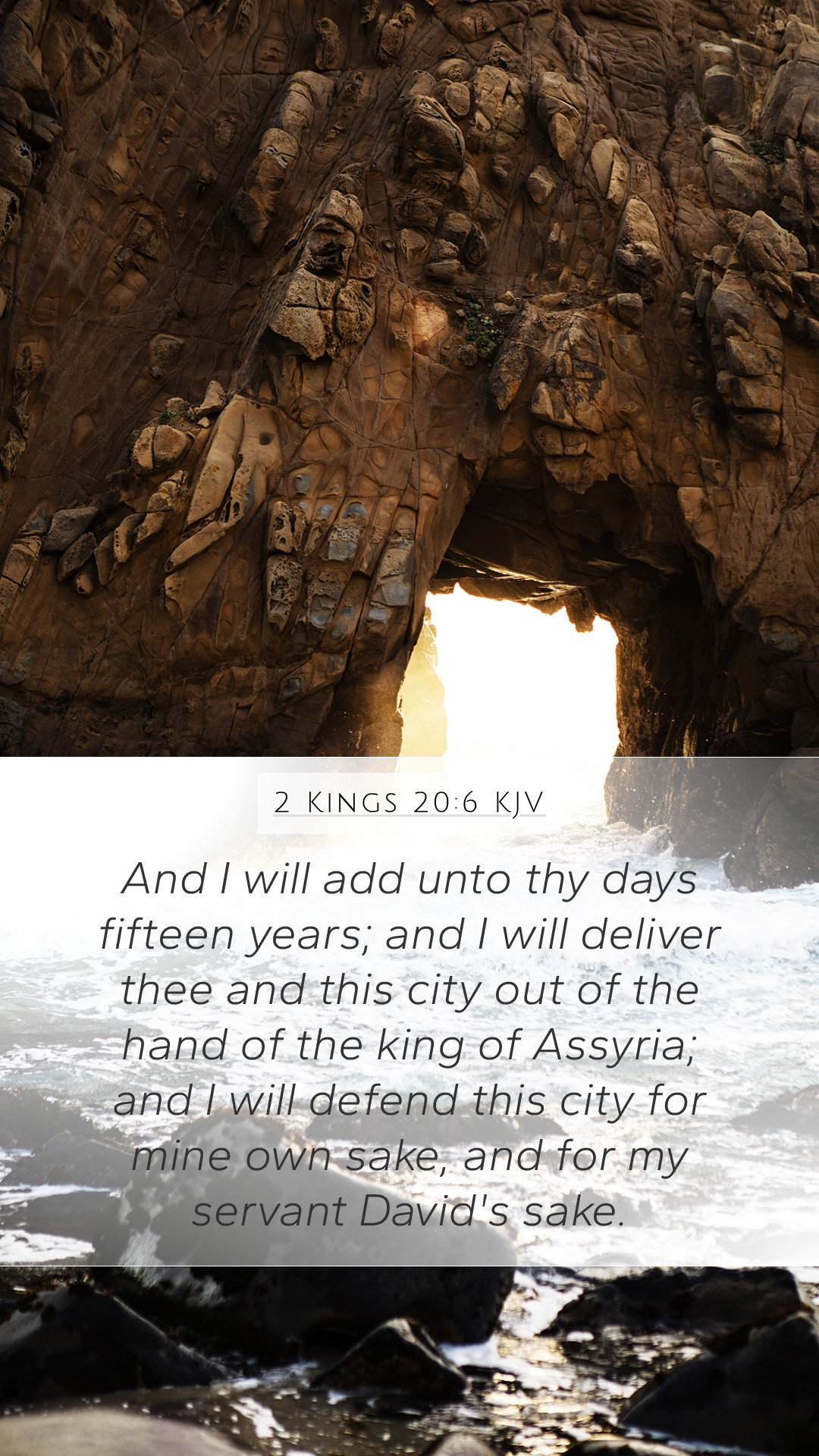Old Testament
Genesis Exodus Leviticus Numbers Deuteronomy Joshua Judges Ruth 1 Samuel 2 Samuel 1 Kings 2 Kings 1 Chronicles 2 Chronicles Ezra Nehemiah Esther Job Psalms Proverbs Ecclesiastes Song of Solomon Isaiah Jeremiah Lamentations Ezekiel Daniel Hosea Joel Amos Obadiah Jonah Micah Nahum Habakkuk Zephaniah Haggai Zechariah Malachi2 Kings 20:6 Meaning
What is the meaning of 2 Kings 20:6?
And I will add unto thy days fifteen years; and I will deliver thee and this city out of the hand of the king of Assyria; and I will defend this city for mine own sake, and for my servant David's sake.
2 Kings 20:6 Bible Verse Meaning
Understanding 2 Kings 20:6
2 Kings 20:6 states: “And I will add unto thy days fifteen years; and I will deliver thee and this city out of the hand of the king of Assyria: and I will defend this city for mine own sake, and for my servant David's sake.” This verse provides deep insights into God’s mercy, His promises, and the significance of faith in dire circumstances.
Bible Verse Meaning
This verse highlights God's response to King Hezekiah's earnest prayer for healing and his plea for deliverance. Through this divine promise, several key interpretations can be drawn:
- Divine Mercy: This verse exemplifies God's mercy and compassion. Despite King Hezekiah's impending death, God decided to extend his life by fifteen years. Matthew Henry emphasizes that God is always willing to show mercy to those who return to Him in repentance.
- Assurance of Deliverance: God also promises deliverance from the Assyrian threat, showing His power and authority over nations. This reflects the theme of God being a protector and defender of His chosen people.
- Fulfillment of God’s Promises: God’s commitment to defending Jerusalem for His own sake and for the sake of David illustrates His fidelity to His promises. Albert Barnes notes that God’s faithfulness to David’s lineage plays a crucial role in His covenantal history.
- Significance of Prayer: Hezekiah’s prayer was pivotal; it illustrates the importance of seeking God in times of crisis. Adam Clarke emphasizes that earnest prayer and supplication can bring about miraculous outcomes.
- Historical Context: This verse must be understood within the larger narrative of the decline of the Kingdom of Judah and the threats posed by foreign powers, particularly Assyria. The historical context reveals the geopolitical tensions of the time, which underscore the need for divine intervention.
Bible Verse Interpretations from Commentators
Insights from various public domain commentaries help deepen our understanding of this passage:
-
Matthew Henry's Commentary:
Henry reflects on Hezekiah's distressed state as he faced a terminal illness and imminent invasion. His sincere prayer profoundly moves God, who responds not only with healing but with a miraculous extension of life and peace. Henry highlights God's sovereignty and perfect timing in administering mercy.
-
Albert Barnes' Notes:
Barnes emphasizes that the extension of Hezekiah's life underscores the intimate relationship between God and His servants. He comments on the significance of how God prioritizes Jerusalem's safety because of His commitment to David’s legacy.
-
Adam Clarke's Commentary:
Clarke points out that the expression “I will deliver thee” indicates God’s active intervention in worldly matters, reinforcing the belief that God's providential care encompasses both spiritual and earthly concerns. Clarke also explores the theological implications of God's promise in this context.
Scripture Analysis
This passage is rich in doctrinal significance and theological insights. The key themes include:
- God's Sovereignty: God is ultimately in control, and His will prevails over human affairs.
- Faith and Prayer: The passage teaches the importance of aligning oneself with God’s will through prayer.
- Hope and Restoration: Hezekiah’s story inspires believers to hold onto hope, illustrating that God can bring restoration even when circumstances look bleak.
Application of This Verse in Daily Life
The relevance of 2 Kings 20:6 transcends its historical context. Here are ways this verse can be applied in our lives:
- Encouragement in Trials: Like Hezekiah, believers facing difficult times can take comfort in God’s promises and His willingness to respond positively to prayer.
- Trust in God's Timing: This verse encourages patience and trust in God’s timing when facing challenges or seeking divine assistance.
- Commitment to Prayer: Regular prayer like that of Hezekiah can draw us closer to God and align our hearts with His will.
- Faithfulness to God’s Covenant: Understanding God’s promises can motivate believers to remain faithful and committed to their relationship with Him.
Cross References
This verse is connected to several other significant Scripture passages:
- Isaiah 38:5: A parallel account of God’s promise to Hezekiah.
- 2 Chronicles 32:24-26: Further details on Hezekiah's health crisis and God's response.
- Psalm 91:15: Affirms God's promise of protection and deliverance for those who call on Him.
- Jeremiah 33:20-21: Discusses God’s enduring promises for His covenant people.
- Romans 8:28: Illustrates God's sovereign ability to work everything for good.


